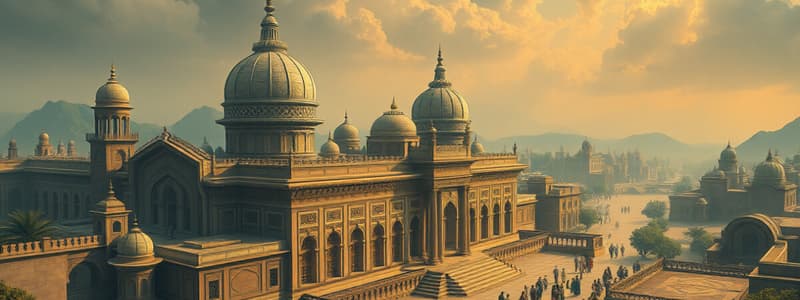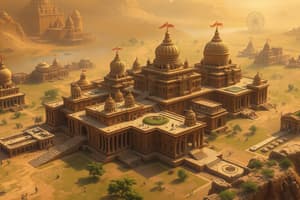Podcast
Questions and Answers
What was the main occupation of the people of the Indus Valley?
What was the main occupation of the people of the Indus Valley?
- Hunting
- Farming (correct)
- Trading
- Fishing
Which animal was NOT mentioned as being domesticated by the Indus Valley people?
Which animal was NOT mentioned as being domesticated by the Indus Valley people?
- Horses (correct)
- Goats
- Buffaloes
- Cats
What is another name for the Indus Valley civilization?
What is another name for the Indus Valley civilization?
- Mayan civilization
- Harappan civilization (correct)
- Mesopotamian civilization
- Sumerian civilization
What types of crafts were the Indus Valley people skilled in?
What types of crafts were the Indus Valley people skilled in?
Which of the following was a form of recreation for the Indus Valley people?
Which of the following was a form of recreation for the Indus Valley people?
Which of the following is a major site of the Indus Valley civilization?
Which of the following is a major site of the Indus Valley civilization?
What characteristic describes the town planning of Indus Valley cities?
What characteristic describes the town planning of Indus Valley cities?
What material was primarily used to make toys for children in the Indus Valley?
What material was primarily used to make toys for children in the Indus Valley?
What material was primarily used in the construction of Indus Valley houses?
What material was primarily used in the construction of Indus Valley houses?
Which agricultural products were primarily grown by the Indus Valley farmers?
Which agricultural products were primarily grown by the Indus Valley farmers?
Which of the following statements is true about the Indus Valley people's approach to leisure?
Which of the following statements is true about the Indus Valley people's approach to leisure?
What was the primary function of the Great Granary at Harappa?
What was the primary function of the Great Granary at Harappa?
What indicates the Indus Valley civilization's early interest in fashion?
What indicates the Indus Valley civilization's early interest in fashion?
Which feature indicates advanced sanitary engineering in the Indus Valley civilization?
Which feature indicates advanced sanitary engineering in the Indus Valley civilization?
How many rows of granaries were found at the Great Granary in Harappa?
How many rows of granaries were found at the Great Granary in Harappa?
Which item was a staple food for the Indus Valley civilization?
Which item was a staple food for the Indus Valley civilization?
What type of garments did both men and women in the Indus Valley civilization typically wear?
What type of garments did both men and women in the Indus Valley civilization typically wear?
Which statement best describes the drainage system of the Indus Valley civilization?
Which statement best describes the drainage system of the Indus Valley civilization?
What was likely the purpose of the Assembly Hall in Mohenjodaro?
What was likely the purpose of the Assembly Hall in Mohenjodaro?
Which of the following best describes the ornaments worn by the rich in the Indus Valley civilization?
Which of the following best describes the ornaments worn by the rich in the Indus Valley civilization?
What type of diet did the Indus Valley people consume with their staple foods?
What type of diet did the Indus Valley people consume with their staple foods?
What feature distinguished the Great Bath at Mohenjodaro?
What feature distinguished the Great Bath at Mohenjodaro?
How was the social structure of the Harappan society organized?
How was the social structure of the Harappan society organized?
What materials were the pillars of the Assembly Hall likely made from?
What materials were the pillars of the Assembly Hall likely made from?
What type of jewelry did poorer individuals typically wear?
What type of jewelry did poorer individuals typically wear?
Which archaeological site was discovered by Dayaram Sahni?
Which archaeological site was discovered by Dayaram Sahni?
What is the time frame during which the Indus Valley civilization is estimated to have flourished?
What is the time frame during which the Indus Valley civilization is estimated to have flourished?
Which of the following statements about the Indus Valley civilization is incorrect?
Which of the following statements about the Indus Valley civilization is incorrect?
What does the name 'Mohenjodaro' literally translate to?
What does the name 'Mohenjodaro' literally translate to?
Which modern city is located near the ancient site of Harappa?
Which modern city is located near the ancient site of Harappa?
Which material was primarily used during the Indus Valley civilization?
Which material was primarily used during the Indus Valley civilization?
What was the primary source of trade for the Indus Valley civilization?
What was the primary source of trade for the Indus Valley civilization?
What factor delayed the recognition of the Indus Valley civilization?
What factor delayed the recognition of the Indus Valley civilization?
Which of these sites is not directly linked to the Indus Valley civilization?
Which of these sites is not directly linked to the Indus Valley civilization?
Which materials were primarily used to make seals in the Indus Valley Civilization?
Which materials were primarily used to make seals in the Indus Valley Civilization?
Which river is Mohenjodaro located near?
Which river is Mohenjodaro located near?
What was the primary method of trade in the Indus Valley civilization?
What was the primary method of trade in the Indus Valley civilization?
Which artifact is often associated with the religious beliefs of the Indus Valley people?
Which artifact is often associated with the religious beliefs of the Indus Valley people?
Where did the Harappans get their copper from?
Where did the Harappans get their copper from?
What does the figure referred to as Pashupati represent?
What does the figure referred to as Pashupati represent?
Which of the following best describes the trade relations of the Indus Valley civilization?
Which of the following best describes the trade relations of the Indus Valley civilization?
What type of transportation was likely used by the Indus Valley traders?
What type of transportation was likely used by the Indus Valley traders?
What was notable about the seals found in the Indus Valley?
What was notable about the seals found in the Indus Valley?
Which of the following deities is mentioned in relation to the Indus Valley civilization?
Which of the following deities is mentioned in relation to the Indus Valley civilization?
How many seals have been unearthed from Indus Valley sites?
How many seals have been unearthed from Indus Valley sites?
Study Notes
Overview of the Indus Valley Civilization
- Encompassed northern and western India with around 2,800 discovered sites.
- Known as the largest civilization of the ancient world, flourishing between 2500 BCE and 1500 BCE.
- Referred to as the Harappan civilization due to Harappa being the first unearthed site.
Major Sites
- Significant locations include Lothal, Ropar, Kalibangan, Alamgirpur, Banawali, Rakhigarhi, and Dholavira.
- Mohenjodaro served as one of the largest settlements.
Characteristics
- Advanced urban planning with a grid system, featuring straight, wide streets intersected by smaller roads.
- Architecture included well-constructed dwelling houses and public buildings, made from high-quality baked bricks.
Town Planning
- City grids divided into rectangular blocks with paved streets.
- Streets were designed for easy movement of carts, enhancing urban function.
Dwelling Houses
- Houses varied in size from small to palatial, typically double-storeyed with flat roofs.
- Common features included courtyards, kitchens, bathrooms, and wells.
Public Buildings
- The Great Granary at Harappa was essential for storing surplus food.
- Granaries strategically located near rivers for efficient transport.
Economy and Occupation
- Main occupation: agriculture, cultivating wheat, barley, fruits, and vegetables.
- First civilization to cultivate cotton; equipped with fertile land supporting large populations.
Domestication of Animals
- Species included goats, sheep, buffaloes, and elephants; dogs and cats were common pets.
Art and Craftsmanship
- Renowned for pottery created on a potter's wheel, often glazed and decorated.
- Worked with terracotta for cultural figurines and had knowledge of metallurgy.
Recreation and Leisure
- Favored indoor games; children played with toys made from baked clay.
- Engaged in activities like dancing, singing, and board games.
Trade
- Active trade networks with Mesopotamia, Persia, and Afghanistan, evidencing shared seals in both regions.
- Utilized a barter system and various weights for trade; transport included bullock carts and boats.
Seals
- Over 2,000 seals discovered, providing insights into social conduct, trade, and religious beliefs.
- Engravings often featured animals and had not yet deciphered script, which hints at more cultural depth.
Religion and Spirituality
- Lack of temples; many artifacts suggested worship of female deities and a significant three-faced figure, Pashupati.
- The pipal tree and a statue known as the Priest King were also significant in religious contexts.
Sanitation
- Exhibited advanced sanitation measures; cities featured connected drains for kitchens and bathrooms, designed for cleanliness.
Society Structure
- Organized into diverse social groups: rulers, merchants, artisans, and laborers.
- Evidence of a structured community life marked by artisan crafts and trade.
Diet and Food Sources
- Staple foods included wheat, barley, and animal products like milk and fish.
- Balanced diet supported by farming practices and domesticated animals.
Dress and Ornaments
- Garments made from cotton and wool; men wore dhoti-like attire, while women wore skirts and shawls.
- Jewelry crafted from materials ranging from gold and ivory for the wealthy to shells and copper for the poorer populace.
Notable Structures
- Assembly Hall in Mohenjodaro featured 20 brick pillars, serving multiple purposes like gatherings or religious activities.
- The Great Bath demonstrated advanced public bathing practices and had architectural significance.
Decline and Theories of Collapse
- Civilization's decline attributed to natural disasters, invasions, or changes in river courses.
- Showed resilience as the discovery of its ruins highlights a rich cultural legacy.
Important Terms
- Seals: Clay stamps used for trade purposes.
- Drainage System: Infrastructure for managing waste and sanitation.
- Granaries: Storage facilities for surplus grain.
- Great Bath: A significant public bathing area used for rituals.
- Terracotta: Baked clay used for pottery and figurines.
- Mother Goddess: Central female deity in Harappan worship.
Significance
- The Indus Valley civilization remains a testament to early urban planning, trade, and cultural sophistication, inspiring modern urban sanitation and city planning.
Studying That Suits You
Use AI to generate personalized quizzes and flashcards to suit your learning preferences.
Description
Explore the fascinating aspects of the Indus Valley Civilization, one of the largest ancient civilizations. This quiz covers key sites, urban planning, architecture, and the characteristics that defined this remarkable culture between 2500 and 1500 BCE.




